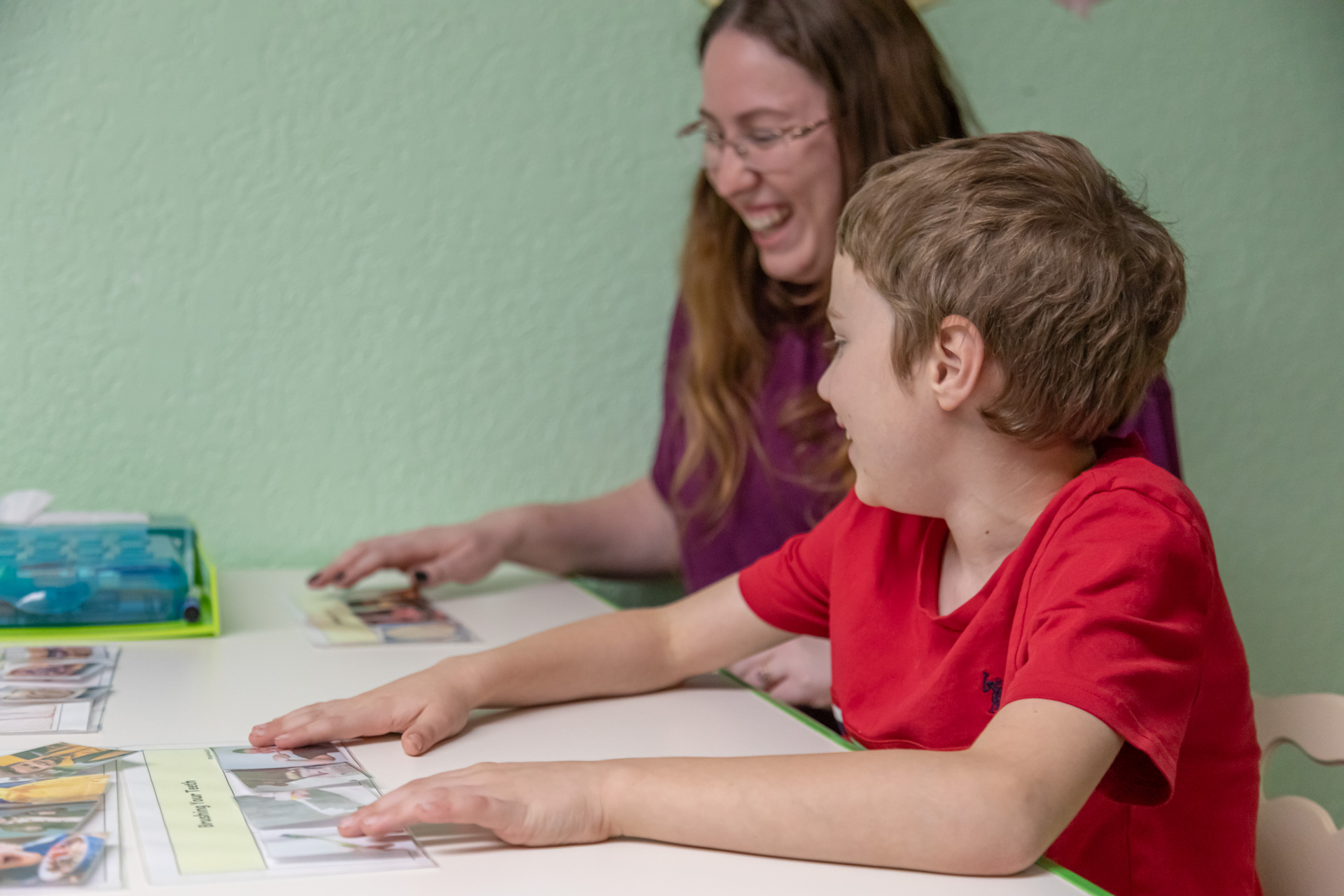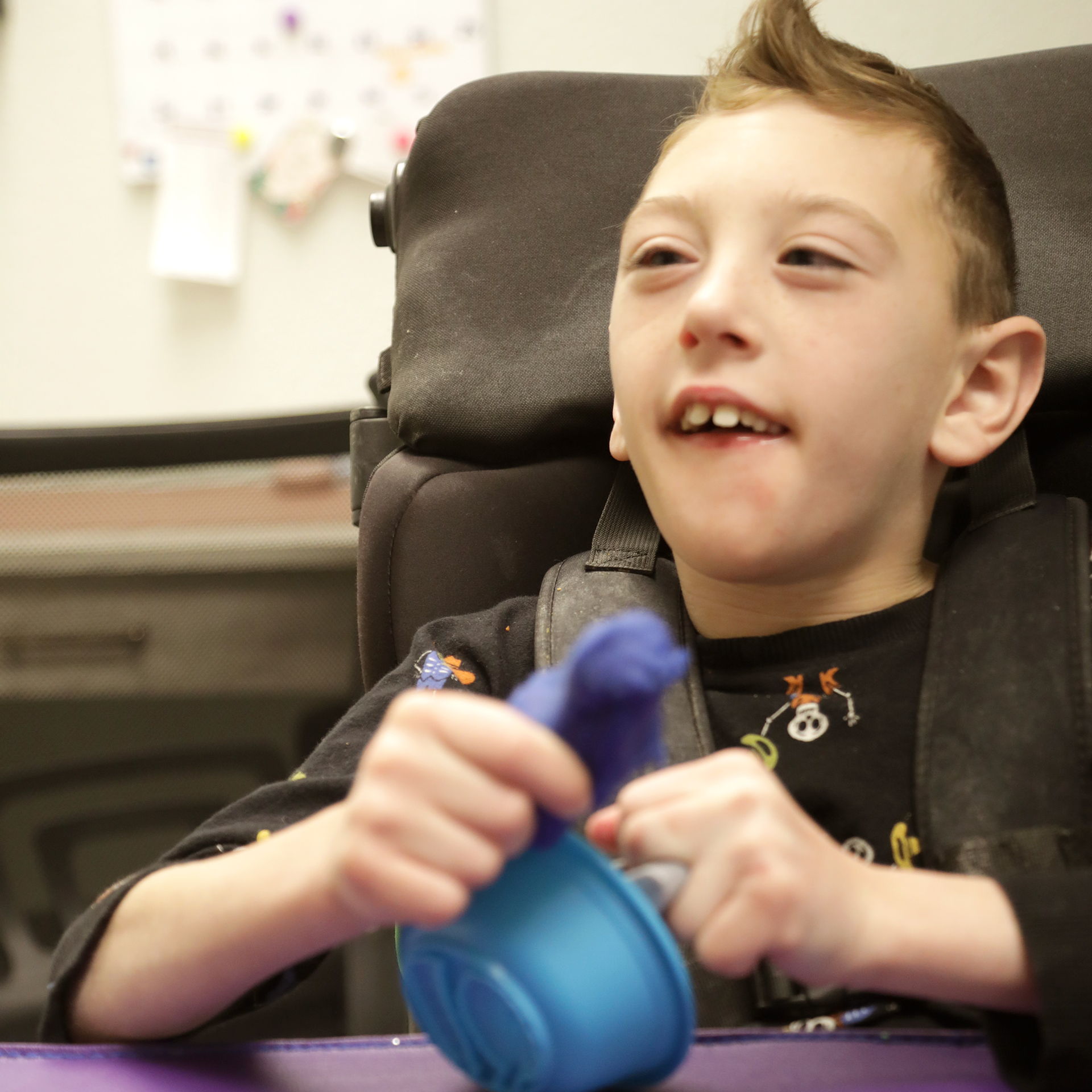Speech Therapy Early Intervention


Understanding the Significance of Early Speech Therapy
Early speech therapy plays a vital role in shaping a child's ability to communicate, learn, and develop social skills. When implemented promptly after signs of delay or difficulty are identified, these interventions have the potential to significantly improve long-term developmental outcomes. This comprehensive approach involves assessments, tailored therapies, family involvement, and ongoing support, ensuring that every child has the chance to reach their full potential.
What is Early Intervention for Speech and Language?
What is early intervention for speech and language?
Early intervention in speech and language is a proactive approach to identifying and supporting children who experience difficulties with communication skills during their crucial early years. It involves providing specialized therapy and support tailored to each child's needs, ideally as soon as delays or disorders are detected, often before the child enters kindergarten.
This process begins with assessments conducted by licensed or credentialed professionals such as speech-language pathologists (SLPs) or early intervention specialists. These evaluations help determine if a child has a speech delay, language disorder, or is at risk for developing communication challenges. Based on the assessment outcomes, a personalized plan called an Individualized Family Service Plan (IFSP) is created, setting specific goals and outlining the services necessary.
Therapies are delivered in various settings, including the child's home, daycare, clinics, or community spaces like parks or libraries. These sessions may involve play-based activities, storytelling, singing, and routines that encourage communication in a natural environment. Early intervention for speech and language not only aims to improve articulation, vocabulary, and sentence structure but also enhances social skills, confidence, and academic readiness.
The importance of early support is backed by research indicating that prompt intervention can lead to significant improvements, reduce the severity of speech issues, and facilitate better long-term outcomes. Additionally, involving parents and caregivers actively through training and home activities maximizes the progress and supports continued development outside therapy sessions.
In summary, early intervention for speech and language encompasses early assessment, personalized therapy, and family-centered practices delivered in familiar environments—ensuring children develop effective communication skills vital for their overall growth and success.
Assessment and identification processes
The assessment process typically begins with a referral from a parent, caregiver, healthcare provider, or teacher. Once a referral is made, a service coordinator conducts a comprehensive evaluation considering the child's gestures, sounds, understanding, social interactions, and responses. These assessments help determine if the child qualifies for services based on whether they demonstrate a delay or disorder in speech, language, or related developmental areas.
An essential part of the process is culturally and linguistically responsive evaluation, ensuring that language diversity does not affect eligibility determinations. Children who are hearing-impaired, deaf, or exhibit speech sound errors like lisps or stuttering are also evaluated to address their specific needs.
Types of therapy settings and programs
Interventions can take place in various settings to suit the child's comfort and family routines:
| Setting | Description | Advantage |
|---|---|---|
| Family home | Therapy conducted in the child's familiar environment | Promotes naturalistic learning and family involvement |
| Childcare centers or preschools | Therapy in educational settings | Integrates learning with daily routines |
| Community spaces (parks, libraries) | Community-based sessions | Accessible and engaging outdoor or public settings |
| Clinical clinics | Therapist private practice or specialized centers | Provides intensive, targeted therapy |
Services are often provided in a combination of these settings, tailored to the child's needs. Family participation and active involvement are emphasized, as they significantly improve therapy outcomes. The goal is to embed communication strategies into everyday routines, making support seamless and effective.
If a child shows signs of delay, such as limited vocabulary, difficulty understanding instructions, or inconsistent speech, early intervention programs should be sought promptly. In doing so, children have a better chance of overcoming obstacles, gaining confidence, and developing the communication skills necessary for success in school and beyond. Organizations and professionals dedicated to early childhood development continue to promote awareness and accessibility, ensuring more children receive timely, effective speech and language support.
Understanding Eligibility Criteria and the Evaluation Process

When should you start early intervention for speech?
Early intervention for speech should begin as soon as signs of delay or disorder are noticed. The optimal time is typically around 1.5 to 2 years of age, when children start developing essential speech milestones like babbling, imitating sounds, and using simple words.
Parents and caregivers should consider seeking an assessment if their child isn't meeting these milestones. For example, limited vocabulary, not responding to sounds, or difficulty understanding speech are indicators that intervention might be needed.
Early diagnosis and support are crucial because brain plasticity is highest during the first three years of life. This allows children to learn new skills more easily and can prevent more significant challenges later.
Children showing additional signs of autism, developmental delays, or other health issues may need to be evaluated even earlier. Prompt action ensures children receive the help they need during this critical period.
Initiating services early not only improves speech and language development but also supports overall growth, including cognitive, social, and emotional skills. The sooner intervention starts, the better the chances are for children to reach their full potential in communicating effectively and engaging safely with their environment.
What are the eligibility requirements for early speech intervention?
Eligibility for early speech intervention typically involves an evaluation showing that a child has a developmental delay or disorder affecting speech or language skills. Specific criteria include:
- A significant delay in expressive and receptive language skills compared to age expectations.
- Difficulties with speech sounds, such as articulation errors or phonological processes.
- Challenges with understanding or using language, including vocabulary, syntax, or pragmatics.
- Signs of speech impediments like stuttering, lisps, or voice disorders.
- Presence of diagnosed conditions like autism, hearing loss, or other developmental disabilities that impact speech.
The determination is based on assessments of the child's skills relative to developmental norms. Children demonstrating delays of at least 25% in one or more areas of development, or with medically diagnosed conditions affecting speech, qualify for services.
How is eligibility determined through evaluation?
The process starts with a comprehensive assessment conducted by a multidisciplinary team. This team may include speech-language pathologists, early intervention specialists, pediatricians, audiologists, and developmental psychologists.
During evaluation, various methods are used:
- Standardized tests aligned with developmental benchmarks.
- Observation of the child in natural settings.
- Parent interviews and questionnaires.
- Play-based activities that help assess communication skills.
These assessments help identify strengths and areas needing support, forming the basis for eligibility. Analyzing the results ensures that children who require assistance are accurately identified and receive appropriate services.
Role of multidisciplinary teams in assessment
Assessment for early speech intervention is collaborative. A team approach ensures a thorough understanding of the child's needs from multiple perspectives.
Team members bring expertise in different areas, such as speech, hearing, physical development, and cognitive skills. They work together to evaluate:
- Speech sound production
- Language comprehension and use
- Social communication behaviors
- Cognitive and motor skills
This comprehensive evaluation supports the creation of an individualized plan tailored to the child's unique needs. Family input is also integral, helping to set meaningful goals and ensure services are family-centered.
By working collaboratively, the multidisciplinary team ensures that intervention plans are accurate, holistic, and effective, setting children on the right path for developmental success.
Techniques and Methods in Early Speech Therapy

What do speech therapists do in early intervention?
Speech therapists play a crucial role in early childhood intervention for children with communication delays or disorders. They assess a child's speech and language abilities through observations of sounds, gestures, and responses, even though young children might not communicate effectively yet. Once they understand the child's unique needs, they develop personalized goals aimed at improving articulation, understanding, and social interaction.
Therapists use engaging, play-based activities like imitation games, musical exercises, and object identification to promote speech development. These activities are designed to be fun and motivating, making learning a natural part of play. They also incorporate muscle strengthening exercises for the mouth and tongue when needed.
A vital part of their work involves working closely with families. They teach parents and caregivers strategies to reinforce skills at home, such as singing songs, reading stories, and using visual cues. This family involvement helps create a supportive environment that encourages consistent progress.
In addition, speech therapists often collaborate as part of a multidisciplinary team with occupational therapists, counselors, and teachers, especially when children face additional challenges like autism or cerebral palsy. Together, they ensure that all aspects of the child's development are supported.
The ultimate goal of early intervention speech therapy is to help children speak confidently, understand language better, and develop effective communication skills that support their overall growth and success in school and social settings.
The Role of Professionals and Family in Speech Development

What are interventions in speech therapy?
Interventions in speech therapy encompass a variety of strategies aimed at helping children with speech and language challenges develop communicative skills. These methods might be implemented directly by trained speech-language pathologists or indirectly through advice given to parents and caregivers. They are applied across diverse environments, including homes, clinics, or schools.
Typical interventions involve activities such as articulation practice, voice control, and fluency techniques. Therapists also work on enhancing receptive language—how children understand language—and expressive language—the ability to communicate thoughts and needs.
The approaches are customized to fit each child's specific difficulties, whether related to speech sounds, vocabulary, grammar, or social language use.
The main goal is to improve the child's ability to express themselves clearly and understand others, which supports their overall social participation and academic success. The selection of interventions relies on solid scientific research, ensuring methods are effective and tailored to foster meaningful progress.
Evidence-based practices are evaluated through rigorous studies, including randomized controlled trials, which help validate their effectiveness in producing better developmental results for children.
Accessing and Navigating Early Speech Intervention Services
How to initiate access to services
Parents and caregivers concerned about a child's speech and language development can start by reaching out to their state's early intervention program. In Texas, for example, families can contact the Texas Health and Human Services Commission's program for evaluations and assessments. Importantly, families do not need a doctor’s referral to access these services. Most evaluations are free and involve a team of licensed professionals such as speech-language pathologists, early intervention specialists, and developmental experts.
Upon referral or self-initiation, a service coordinator works closely with the family to assess the child's skills and determine eligibility. This process often includes play-based observation and using state-approved assessment tools. If eligible, an Individualized Family Service Plan (IFSP) is created. This personalized plan outlines specific goals, services, and support systems tailored to the child's developmental needs.
Understanding funding and cost considerations
Funding for early speech intervention services is designed to be accessible to all families. Many programs are free of charge for children enrolled in Medicaid, CHIP, or families with income below 100% of the Federal Poverty Level. For families with higher incomes, a sliding fee scale based on income and family size may apply, which ensures affordability.
Some services, especially those delivered in natural environments like home or daycare, are provided at no cost. The goal of funding structures is to eliminate financial barriers, making early intervention available to all eligible children. It is recommended that families explore local resources, as many states offer specific avenues for free or reduced-cost services.
Transition planning as children grow older
As children approach their third birthday, the focus shifts towards preparing for the transition from early intervention to preschool services or other support systems. A transition plan is developed well in advance to ensure a seamless move. This plan includes scheduled meetings with educators, service providers, and family members to discuss ongoing needs and next steps.
For children with ongoing needs, referrals can be made to local school districts for preschool special education services, which are provided through an Individualized Education Program (IEP). Early planning helps families understand the upcoming changes, secure necessary resources, and avoid gaps in services.
Early intervention services, especially speech therapy, play a vital role in supporting children’s communication skills. Starting early and understanding how to navigate the system ensures children receive the right support at the right time, paving the way for successful developmental trajectories.
Benefits of Early Speech Therapy and Long-Term Impact

How does early speech therapy enhance communication and social skills?
Early speech therapy plays a vital role in helping children develop effective communication abilities. By focusing on improving speech clarity, vocabulary, and understanding of language, therapy enables children to express their needs and ideas confidently. These skills are essential for engaging with peers, building friendships, and participating in social activities.
Moreover, early intervention fosters pragmatic language skills—such as turn-taking and understanding social cues—which are crucial for meaningful interactions. As children practice these skills through play-based activities and family involvement, they learn to navigate social environments more successfully, reducing frustration and social isolation.
What are the positive effects of early intervention on academic success?
Children who receive speech therapy early tend to perform better academically. Improved language skills support reading, writing, and literacy development, which are foundational to education. Early therapy helps children understand and use language effectively in classroom settings, follow instructions, and participate actively in learning.
Research shows that children with strong communication skills are more likely to succeed in school and catch up with their peers. Addressing speech delays before starting kindergarten minimizes gaps in learning and enhances their confidence and motivation to participate.
How does early speech therapy help reduce longer-term developmental issues?
Timely intervention can prevent secondary issues that might develop if speech and language delays are left unaddressed. These include difficulties in social relationships, behavioral challenges, low self-esteem, and academic struggles.
By addressing speech delays early, therapy supports overall brain development, enhancing cognitive skills and emotional well-being. It can also reduce the need for more intensive, costly interventions later in life, making it a cost-effective strategy for promoting lifelong success.
What are the benefits for families and society?
Families often experience less stress when their child's communication challenges are managed early. Active parental involvement through strategies learned in therapy fosters a supportive environment that encourages continued progress.
On a societal level, early speech intervention contributes to better educational outcomes and increased chances of employment and social integration in adulthood. It reduces reliance on special education services and interventions later in life, resulting in long-term economic and social benefits.
| Benefit Area | Outcomes | Additional Notes |
|---|---|---|
| Enhanced communication and social skills | Better peer interactions, increased confidence | Supports social-emotional development |
| Positive effects on academic success | Improved literacy, classroom participation | Early skills foundation |
| Reduction of secondary issues | Decreased behavioral problems, higher self-esteem | Preventive effect of early therapy |
| Family and societal benefits | Less parental stress, economic savings in future | Promotes inclusive, productive communities |
Focusing on these long-term advantages highlights the importance of early speech therapy. Initiating services promptly can set children on a path toward healthier development, better educational prospects, and more fulfilling social relationships.
Ensuring a Bright Future with Early Speech Support
Investing in early speech therapy and intervention is investing in a child's future success. By recognizing signs of speech delay early and accessing prompt, family-centered, and evidence-based services, parents and professionals can make a profound difference. Such early support not only enhances immediate communication skills but also fosters lifelong social, academic, and emotional well-being, enabling children to reach their full potential and thrive in all aspects of life.
References
- Early Childhood Intervention Services | Texas Health and Human ...
- Early Intervention Services - ASHA
- Early Intervention for Speech: What to Expect - About Play
- What is “Early Intervention”? - CDC
- Early Intervention Speech Therapy for Children: A Complete Guide
- The Importance of Early Intervention in Speech Pathology
- Early Intervention Speech Therapy: Activities, Techniques & Goals
- Early Intervention - ASHA
- Why Early Intervention? + Easy Speech Therapy Activities
Recent articles

Celebrating Small Wins: How Therapy Helps Kids Build Confidence All Year Long
Learn why small wins in therapy matter, how they boost your child’s confidence, and simple ways families can celebrate progress all year long.

Empowering Missoula Children to Grow With Confidence and Connection
Learn how ABA therapy in Missoula helps children build communication, independence, and confidence through personalized, family‑centered support at Advanced Therapy Clinic.

Compassionate Pediatric Therapy in Butte, Montana
A welcoming place where every child’s potential is celebrated

How Pediatric Therapy Helps Kids Thrive across Montana and Wyoming
A supportive guide for families exploring therapy options in Billings, Butte, Missoula or Sheridan.

How to Choose the Right Pediatric Therapy Clinic in Billings, Montana
A Parent‑Friendly Guide To Finding The Best Support For Your Child

Expressive Speech Delay 2-Year-Old
Understanding and Addressing Expressive Speech Delay in Toddlers

